Read Kate’s latest article for Labour Outlook:
The 2016 peace agreement in Colombia was a historic moment that brought genuine optimism to many, particularly in the most impoverished regions of the country. It has mechanisms to address what is currently happening, but it has not been implemented anywhere close to the levels it should have. And now the human rights situation in Colombia is out of control. State violence in Colombia is out of control.
The Colombian government is refusing to recognise the scale of the problem, instead seeking to present a squeaky-clean image internationally while innocent civilians are being murdered.
Let’s be clear, recent events in Colombia have been condemned internationally by Governments, the UN, the OAS and Politicians from Parliaments across the World. That is why last month I led a debate in Parliament to call on the UK Government to do everything it can to hold the Colombian Government to account. We cannot support trade deals and training programmes for the Colombian police without also condemning the state violence, and we need to increase our practical support for the peace process.
I have visited Colombia on two occasions, in 2013 and more recently in 2018 on delegations to review the human rights situation and the implementation of the peace agreement. On those visits I met with a wide range of stakeholders. What I heard then, and what I see now is incredibly worrying. The UK has a responsibility to improve the human rights situation in Colombia and to make sure the hope that was given to so many with the peace agreement is not destroyed.
Earlier this year, millions of Colombians took to the streets, but the response of the Colombian police was to treat the protesters, who were from all sectors of Colombian society, as if they were an enemy, to be defeated. The police responded to the protests as if they were at war. The images and videos have been horrifying.
Between 28 April and 26 June, Colombian human rights organisation documented between 26 and 44 protesters likely to have been killed by the police. There were 28 cases of sexual assault reported. 257 cases of violence against journalists covering the protests, including over 100 physical assaults. The UN documented 56 people killed during the protests, 54 civilians and 2 members of the police.
There were numerous incidents and videos which also showed the close collaboration of armed civilians – or para-state actors – and the Colombian police. Something that has been highlighted for decades but repeatedly denied by supporters and defenders of the Colombian political elite. Most notably in Cali on the 10th May and 28th May, where armed civilians came onto the streets to shoot at protesters while standing alongside members of the police. The response of the Colombian President to these incidents was to tell the protesters to go home, whilst at the same time remaining silent regarding the apparent paramilitaries and the police operating side by side.
The response of the Colombian government to the protests and the violence of the police, only highlighted further that this is a government more determined to stigmatise protesters than ensure their protection. As protesters were being killed, the Defence Minister and the Vice President made statements trying to link protesters to criminal organisations, whilst the Justice Minister unbelievably tried to claim the protests formed part of an international criminal conspiracy to tarnish the image of Colombia.
These slurs are unacceptable, and we must unreservedly condemn them. I give my full support to all those protesting peacefully in Colombia and their right to protest must be defended.
This is not a new problem, Colombia has long been one of the world’s most dangerous countries to be a human rights activist, according to the UN, 133 were killed in 2020. It is still the most dangerous country in the world for trade unionists with 22 killed last year. It was also the most dangerous country in the world for environmental defenders in 2019 with 64 killed and a further 44 were killed between 20 July 2020 and 30 April 2021. The British Government has been signing environmental agreements with its Colombian counterparts, but we must ask what is being done to ensure there is protection for those on the front line.
I welcome the investigations that have been opened into the abuses committed by state agents over recent months, but this is not enough. The police are alleged to have killed 13 people during protests in 2020 and violently attacked protesters in 2019 but almost all these cases have still seen no justice for the victims and their families.
The UK government must offer full condemnation of the violence of the Colombian police and Colombian government comments undermining the right to protest; it must also do all it can to ensure that all chapters of the 2016 Peace Agreement are fully implemented. I welcome the repeated statements of support for the peace process from the UK Government over recent years, but this must be backed up with maximum presence, and pressure, wherever and whenever necessary.
